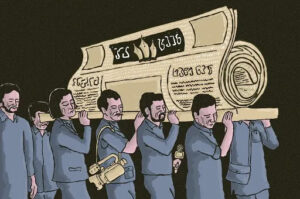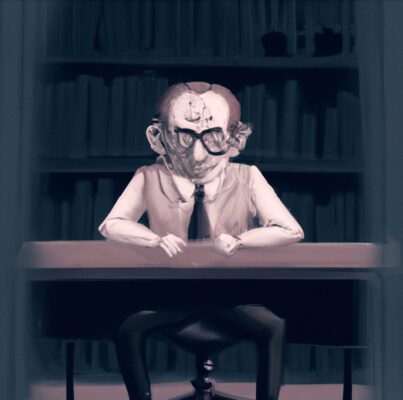
Disappearing media
This is the 199th edition of SHuSH, the official newsletter of the Sutherland House Inc.

Simon Brault\’s imperial mission
About a year ago, in SHuSH 139, I quoted Lord Keynes on the potential pitfalls of government funding of the arts. In the 1940s, Keynes headed a commission that led to the creation of the British Arts Council, on which our Canada Council for the Arts is modelled. He said:
At last the public exchequer has recognized the support and encouragement of the civilizing arts of life as part of their duty. But… everyone, I fancy, recognizes that the work of the artist in all its aspects is, of its nature, individual and free, undisciplined, unregimented, uncontrolled. The artist walks where the breath of the spirit blows him. He cannot be told his direction; he does not know it himself. But he leads the rest of us into fresh pastures and teaches us to love and to enjoy what we often begin by rejecting, enlarging our sensibility and purifying our instincts. The task of an official body is not to teach or to censor, but to give courage, confidence and opportunity.
I also mentioned that the founders of the Canada Council felt so strongly about the dangers of bureaucratic and political impositions on the arts—officials using federal money to force artistic and cultural activities in one direction or another—that they built checks and balances into its founding legislation.
The checks and balances haven’t checked or balanced. The Canada Council is now fully dedicated to teaching, censoring, and directing artistic endeavour.
The occasion for last year’s piece was a decision by Simon Brault, chief executive of the Canada Council, to halt funding for any “activity involving the participation of Russian or Belarusian artists or arts organizations…. This includes partnerships, direct and indirect financing of tours, co-productions, participation in festivals or other events held in Russia.”

The outcome of Brault’s edict was that Canadians last summer weren’t able to enjoy a variety of planned tours by performers who had the misfortune to be born in Moscow, even if they loathed Putin like the rest of us.
It wasn’t the extremity of Brault’s position that set me off—he reserved to himself the right to ban artistic interaction with artists from any country whose government was involved in a conflict he considered unjust—so much as his implication that the arts community was too stupid to have noticed what was happening in Ukraine or to have known how to respond without his guidance.
A few months ago, Brault upped the ante, speaking at the council’s annual general meeting of his “vision for a decolonized future of the arts.”
To actualize this vision, we must also decolonize the Council itself by questioning our own assumptions and convictions.
It is important to acknowledge that decolonization is a complex, evolving, and open concept and journey.
There’s no definitive guide on how to undertake this work.
And it has different implications for different organizations and sectors in our society.
So far, our understanding is that to decolonize the Council, we must agree to reframe our understanding of what constitutes art, which is a big thing for an arts council.
We need also to question the notion of professionalism and artistic disciplines, which are deeply rooted in a very specific time in history, mostly Eurocentric, and often from a very colonialist perspective.
So, we need to challenge the notion of ‘artistic excellence,’ again a concept that upholds hierarchies of good taste and values that confirm and perpetuate the status of the dominant culture.
We also need to move beyond limited notions of artistic expertise because those notions are often the direct product of an education system built to reproduce power relations and safeguard the privilege of a dominant colonial discourse on arts and culture.
There you have it. Brault committed the leading funding agency for the arts in Canada to “challenging” the prevailing understandings of art, artistic professionalism, artistic disciplines, artistic excellence, good taste, artistic values, and artistic expertise.

He’s not quite clear on what he’s going to replace it all with—he’s just sure that the way you think about art is wrong and that Keynes statement that the work of the artist is by nature individual and free, undisciplined, unregimented, uncontrolled, etc., is colonialist claptrap.
Let the regimentation and control begin.
Of course, Brault doesn’t want to be seen as a cultural commissar so he insists that the new vision won’t be decided and imposed by him, that it “has to be learned together with honesty, humility, openness, listening, patience, respect, and empathy.”
I give him credit for openness, although it’s difficult to see any honesty, humility, patience, respect, or empathy when he’s already baked his new vision, standards, values, etc., into the council’s granting criteria.
The Canada Council now operates like the Chinese social credit system. Points are handed out for good social behavior: have you done something equitable, inclusive, sustainable? Might not have anything to do with art (as colonialists would define it) but, if so, more cash for you! If you just want to write exquisitely crafted stories about the complicated lives of mostly white people in Huron County, well, good luck.
In subsequent communications, Brault and his officers have told publishers that they need to get with the new program and quick. Publishers have been busily reconfiguring their websites and public-facing communications to reflect the new priorities, as explicitly as possible. The veteran publishers I’ve spoken to agree that most independent publishers in Canada count on the council for anywhere from 30 to 60 percent of their income. All but a few would be desperately underwater if it weren’t for council funds. If Blithering Colonel Brault says the conventional way of making art is objectionable and there’s some vague new better way, they are in no position to ask questions.
Brault knows this and takes advantage of the mendicancy of the arts community to fulfil his ballooning political ambitions. After launching his decolonization project, he mentioned that he sees the council’s future (and, it follows, the futures of the artists and organizations who take its money) as embracing all manner of political projects, from remaking the workplace to solving the climate crisis to international relations and rebuilding the post-COVID world. Read it for yourself.
It’s sad, dangerous, and ironic.
Sad because it robs artist, publishers, and producers of their agency. They may think there are inequities in the world or that colonialism is problematic or that the war in Ukraine is unjust (most of us do), but if they choose to speak or act on those thoughts while taking Brault’s grants they’ll be seen, especially by those who disagree, as bought-and-paid for tools of a state agency rather than as free and incorruptible voices walking “where the breath of the spirit blows.”
Dangerous because while the current government may be cool with what he’s up to, there’s a good chance the next one will want to undo it in a savage manner. Who knows who’ll win the next election, but Pierre Poilievre’s Conservatives have been leading in the polls for some time. Poilievre’s Conservatives are not Stephen Harper’s Conservatives. The culture wars had barely started in the Harper years. Old Steve saw no political margin in picking fights with the CBC and the arts community, much as he disliked both and knew that both disliked him. Poilievre is a genuine cultural warrior. His base sends him money when he beats up on his cultural enemies. That’s why he rarely misses a chance say he’ll defund the CBC. And the CBC is more neutral and circumspect than Brault’s Canada Council. By press-ganging the country’s publishing houses and arts organizations and their websites into his private cultural army, Brault is making a sitting duck of the whole cultural sector.

Ironic because arts communities in the Cowichan Valley, Portage La Prairie, Haliburton, and Annapolis Royal are being told by a remote and powerful authority that their standards and practices of art are wicked and illegitimate, that they have no right to cultural sovereignty and self-determination and if they want to eat, they will submit to re-education and work for a greater good articulated by representatives of the crown.
Sounds rather like the system of exploitation Brault wants to displace.

This is the 199th edition of SHuSH, the official newsletter of the Sutherland House Inc.

There was an interesting piece in the New York Times a week or so ago about James Daunt (above), the incoming chief executive of Barnes & Noble, the most important bookstore chain in the English-speaking world. It didn’t quite get to the nub of the matter. Barnes & Noble has

The world of non-fiction from Sutherland House ( and Beyond )